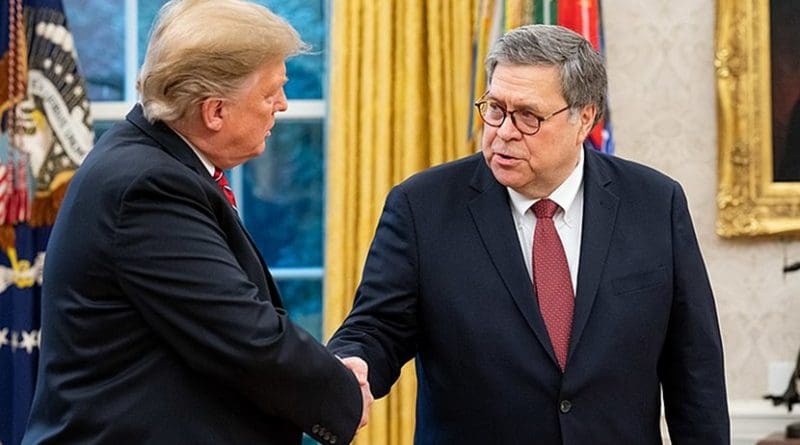Scrutiny Of US Political System Inspires Awe Once Again – OpEd
By Arab News
By Abdel Aziz Aluwaisheg*
To be in Washington these days is to experience one of those epic periods when the American political system works to heal itself. The release last week of the Mueller Report on Russian and other foreign interference in the 2016 presidential election created a maelstrom of debate on whether it provided enough grounds for the US House of Representatives to commence proceedings to impeach President Donald Trump, launch public exploratory hearings, or wait until American voters make their own judgment in the 2020 election.
I was in Washington when the redacted report was released on April 18, and the reactions to its release reminded me of other times when reports of weighty investigations were released, such as the Iran-Contra report during President Ronald Reagan’s time, the report on President Bill Clinton’s relationship with a White House intern, or the Sept. 11 commission’s report. The Mueller report has it all — consequential international intrigue, shady commercial deals, and moral transgressions.
The report left no doubt that there was malign foreign interference in the 2016 election, but did not indict the president for involvement in that meddling, or explicitly exonerate him. Several of the other characters in the report have been indicted, prosecuted and convicted, but Robert Mueller was unable to indict Trump because the Department of Justice believes that only Congress can prosecute a sitting president. Mueller’s report is, in a way, challenging the House of Representatives, now controlled by a Democratic majority, to take action. Democrats were hoping that Mueller would indict the president, thus saving them from taking the risky step of trying to impeach him.
Not fully knowledgeable about the political calculus of American elections, I was surprised that some Democratic Party representatives were hesitant about going through with impeachment for fear that it could backfire.
Some eminent constitutional scholars, such as Laurence Tribe and Cass Sunstein, have also weighed in. Long before the Mueller Report came out, they had consistently made the case, in books and articles dedicated to the issue, as well as on social media, for the need to start the process of impeaching President Trump. The long list of indiscretions catalogued in the report helped them make the case again for impeachment, arguing that the US Constitution now requires it, and not merely allows it.
As an outsider, I was quite in awe of the ability of the American system to investigate itself and take corrective actions. I know that many in the US are cynical about their political process but, compared with other countries, such as Russia, France or many developing countries, it has been able to self-correct over and over again. Take the scandals involving spy agencies in the 1960s and 1970s, when the CIA was accused of assassinating foreign leaders and plotting coups d’etat, and Congress subsequently passed laws that made such acts more difficult. The Watergate scandal led to greater limits on presidential powers and a strengthening of the oversight of federal elections. Similarly, the investigation of Oliver North and Robert McFarlane’s shenanigans, when they tried to help arm and fund the Contras of Nicaragua by concocting an international carousel of shady deals, resulted in greater transparency on such actions.
In some ways, the actions listed in the Mueller Report are a throwback to the days when the White House had more leeway than it has now. For example, in reference to his actions during the Watergate scandal, President Richard Nixon used to say: “Well, when the president does it, that means that it is not illegal.” Subsequent administrations avoided such assertions, for fear that they would incriminate themselves politically and violate the rule that nobody was above the law. But those claims of presidential legal infallibility underline much of the Mueller Report. Recently, Rudy Giuliani, Trump’s lawyer, told the New Yorker magazine: “Even if he did do it, it wouldn’t be a crime.” On another occasion, New York magazine quoted him as saying that the president “can’t be indicted, can’t be questioned because it interferes with the presidency.”
According to Giuliani and other supporters, ordinary laws do not apply to the president: The only check on a sitting president is impeachment proceedings by the House of Representatives and, if impeached, removal by the Senate. Of course, such assertions are challenged by legal scholars, but in some way Giuliani is challenging Congress to act.
The coming days and weeks will be interesting to find out whether Congress does act and start impeachment, or if it lets the fog over the scandals contained in the Mueller Report drag on during election season, which has started early. Alternatively it could take the middle ground by holding investigative hearings, rather than impeachment, to gauge voter reactions before taking a tougher stand. Most likely, Congress will insist on getting the full Mueller Report, not the redacted version.
Another likely escalation would be for Congress to ask Mueller to testify. Mueller can be an imposing witness, especially if he speaks publicly under oath. At 74 years of age, he is a decorated soldier, prominent lawyer, federal prosecutor and, for 12 years, the FBI director under presidents George W. Bush and Barack Obama. And he is a Republican. It would be difficult to question his credibility. His refrain from indicting the president can make him more credible and may make the case for impeachment more compelling, as the only legal recourse available.
For outsiders, it will be supreme public theater. For Americans, it will be a momentous undertaking, not only for Trump’s presidency and re-election prospects, but for future elections and how to immunize them from foreign interference.
- Abdel Aziz Aluwaisheg is the Gulf Cooperation Council (GCC) assistant secretary-general for political affairs and negotiation, and a columnist for Arab News. The views expressed in this piece are personal, and do not necessarily represent those of the GCC. Twitter: @abuhamad1

